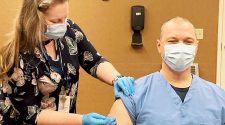Happy Friday, readers!
The University of California, San Francisco (UCSF) is out with a fascinating new study on why some people can, comfortably, get through their days with just four to six hours of sleep on a consistent basis. Call it the science of sleep.
What drives this phenomenon (at least for a slice of folks)? Mutations in a number of genes (the latest study, 10 years in the making, examines a second gene after the preliminary discovery).
Here’s a broader writeup of the new report. Don’t fret too much, though. These specific mutations are pretty rare. And I hope, regardless of your sleep habits, you have some fun and get some rest this weekend.
We’ll be offline on Monday, September 2 for the Labor Day holiday, but back in your inbox on Tuesday. Read on for the day’s news, and have a wonderful three-day weekend.
Sy Mukherjee, @the_sy_guy, [email protected]
DIGITAL HEALTH
Could genetics affect sexual behavior? Speaking of genetics… A new, and sure to be controversial, study examines whether or not genetics can influence sexual behavior. The research set out to answer whether or not something akin to a “gay gene” exists. But the conclusions were fairly vague, finding that a combination of genetic and environmental factors may sway sexual behavior. (Reuters)
INDICATIONS
Amgen takes on Alexion’s top-selling drug Soliris. Shares of rare drug specialist Alexion Pharmaceuticals sank more than 10% in Friday trading as biotech giant Amgen challenged patents on its top-selling drug, Soliris. The ultimate fate of this dispute is up in the air – after all, just last week, there were rumors that Amgen may actually buy Alexion. It could all just be strategic positioning. Or it could be the beginning of a long, ugly IP dispute. (BioPharma Dive)
THE BIG PICTURE
CDC, FDA say there have been more than 200 cases of respiratory illness possibly related to vaping. Federal public health agencies said on Friday that there have been more than 200 cases of lung disease potentially associated with e-cigarette and vaping products across 25 states this year. “While some cases in each of the states are similar and appear to be linked to e-cigarette product use, more information is needed to determine what is causing the respiratory illnesses,” the agencies said in a joint statement. (Reuters)
REQUIRED READING
Dorian Is Now a Major Hurricane—And It’s Roaring Toward Florida, by Chris Morris
The 3 Biggest Risks Facing CEOs, by Alan Murray
Stuck in a Boring Job? Here’s What to Do, by Anne Fisher
Find past coverage. Sign up for other Fortune newsletters.














